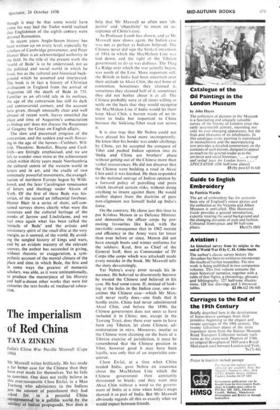The imperialism of Red China
TAYA ZINKIN
India's China War Neville Maxwell (Cape 100s) Mr Maxwell writes brilliantly. He has made a far better case for the Chinese than they have ever made for themselves. Yet he fails to convince. One does not really believe in this ever-reasonable Chou En-lai, in a Mao Tse-tung who administers to the Indians Just the amount of punishment they had asked for, in a peaceful China misrepresented to a gullible world by the subtlety of Indian propaganda. Nor does it
help that Mr Maxwell so often uses 'ob- jective' and 'objectivity' to mean an ac- ceptance of China's case.
As Professor Lamb has shown, and as Mr Maxwell now shows again, the Indian case was not as perfect as Indians believed. The Chinese never did sign the Simla Convention of 1914 in which the MacMahon Line was laid down, and the right of the Tibetan government to do so was dubious. The Thag La Ridge over which the war actually began, was north of the Line. More important still, the British in India had been uncertain over their attitude to Aksai Chin, the real bone of contention. Sometimes they claimed it, sometimes they claimed half of it, sometimes they did not bother about it at all. The Chinese probably were at all times willing to settle on the basis that they would recognise the MacMahon Line if India would let them keep Aksai Chin, a barren waste of no in- terest to India but important to China because the Sinkiang-Tibet road ran across it.
It is also true that Mr Nehru could not have played his hand more incompetently. He knew that his border was under challenge by China, yet he accepted the conquest of Tibet and pushed Indian opinion into its 'India and China are brothers' phase without getting out of the Chinese more than verbal reassurances. He did not discover that the Chinese were building a road in Aksai Chin until it was finished. He then responded to the national outrage of Indian opinion by a forward policy of patrolling and posts which involved certain risks, without doing anything to insure against them. He would neither depart from the doctrine of pure non-alignment nor himself build up India's force.
On the contrary. He chose just this time to put Krishna Menon in as Defence Minister and demoralise the officer corps by pro- moting favourites like Kaul, with the inevitable consequence that in 1962 morale and efficiency in the Army were far lower than ever before or since. Menon did not have enough boots and winter uniforms for the soldiers; Kaul, first as Chief of the General Staff, then as Commander of IV Corps (the corps which was attacked) made every mistake in the book. Mr Maxwell tells the story devastatingly.
Yet Nehru's every error reveals his in- nocence. He behaved so disastrously because he trusted the Chinese and believed in his case. He had some cause. If, instead of look- ing at the holes in the Indian case, one ex- amines the Chinese case—which Mr Max- well never really does—one finds that it hardly exists. China had never administered Aksai Chin, and before the 1890s the Chinese government does not seem to have included it in China; nor, except in the Tawang Tract, does there ever seem to have been any Tibetan, let alone Chinese, ad- ministration in NEFA. Moreover, insofar as the Chinese were claiming on the basis of a Tibetan exercise of jurisdiction, it must be remembered that the Chinese position in Tibet, however good it may have been legally, was only that of an imperialist con- queror.
Chow En-lai, at a time when China needed India, gave Nehru an assurance about the MacMahon Line which the Chinese government then constantly threatened to break; and they went into Aksai Chin without a word to the govern- ment of India at a time when India's traps showed it as part of India. But Mr Maxwell obviously regards all this as exactly what we would expect between friends.














































 Previous page
Previous page